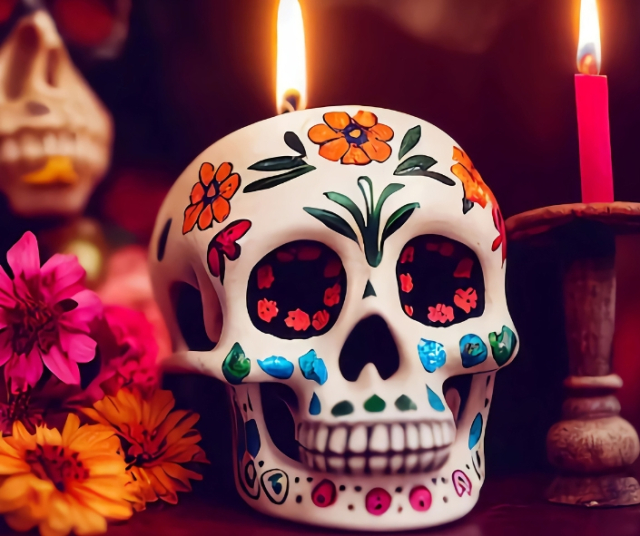The Day of the Dead is one of the most important and emblematic festivities in Mexico . During this celebration, which takes place on November 1 and 2, Mexicans honor their deceased loved ones and celebrate life. The Day of the Dead is a unique blend of indigenous Mesoamerican traditions and Catholic beliefs, which has become a symbol of cultural identity in Mexico.
Origins of the Day of the Dead
The origins of the Day of the Dead go back to ancient Mesoamerican cultures, such as the Aztecs , the Mayans , the Purépechas , and the Toltecs . These civilizations had beliefs and rituals related to death and the afterlife, which laid the foundation for what we know today as the Day of the Dead in Mexico. For the ancient Mexicans, death was not considered the end of life, but rather a stage of transformation towards another form of existence. They believed in the continuity of life after death and in the connection between the world of the living and the world of the dead.
Rituals and celebrations dedicated to the dead were an integral part of the daily life of these cultures. The Aztecs, for example, dedicated an entire month, called Miccailhuitontli, to honoring the dead. During this period, offerings of food and drink were made, religious rituals were performed, and festivities were held in cemeteries.
With the arrival of the Spanish and the imposition of Catholicism in the colonial period, these indigenous traditions merged with Christian beliefs and rituals, especially All Saints' Day and All Souls' Day, which are celebrated on November 1 and 2 respectively. This merger gave rise to what we know today as the Day of the Dead in Mexico . Indigenous and Catholic elements were intertwined, creating a unique celebration that combines ancestor veneration, belief in the continuity of life after death, and religious devotion.
Meaning and beliefs
The Day of the Dead is a celebration based on the belief that the dead return to the world of the living during these days to reunite with their loved ones. It is believed that the spirit of the deceased visits the altars and offerings that are prepared for them, and that the streets are filled with joy and color to receive them.
One of the central beliefs in the Day of the Dead is that death is not to be feared, but celebrated. Mexicans believe that life and death are intrinsically intertwined, and that death is only a transition to a new stage of existence. This perspective allows people to remember and honor their deceased loved ones in a festive and joyous way.
elements and rituals
The Day of the Dead is full of symbolic elements and rituals that bring the celebration to life. One of the most iconic elements are the altars, known as ofrendas, which are set up in homes and cemeteries. These offerings are decorated with flowers, especially cempasúchil, a vibrant orange flower that is believed to attract spirits. There are also photographs of the deceased, candles, food and drink that they used to enjoy in life, as well as personal objects and souvenirs.
Another important aspect of the festivity is the visit to the cemeteries. Families go to the graves of their loved ones to clean, decorate and spend time with them. Flowers are brought, candles are lit and prayers and songs are performed in honor of the deceased. It is an occasion to remember, share anecdotes and reflect on life and death.
Gastronomy plays a fundamental role in the Day of the Dead. One of the most representative dishes is the bread of the dead, a sweet bread decorated with figures that symbolize bones. Other traditional dishes are also prepared, such as mole, tamales, and sugar skulls, which are offered as offerings and shared among living beings.
Art and music are vibrant elements of this festivity. The streets are filled with colorful parades and theatrical performances, known as calendas, in which people dress up as skeletons and catrinas, iconic figures of the Day of the Dead. In addition, traditional music, such as mariachis and music bands, accompanies the celebrations, creating a festive and joyful atmosphere.
Cultural significance and significance
The Day of the Dead is a holiday of deep cultural significance in Mexico. It is a moment of connection with the roots, to honor the memory of the ancestors and to celebrate life in all its manifestations. This celebration has transcended the borders of Mexico and has become a symbol of Mexican culture throughout the world.
This day has also been recognized by UNESCO as Intangible Cultural Heritage of Humanity, highlighting its importance and relevance at a global level.
